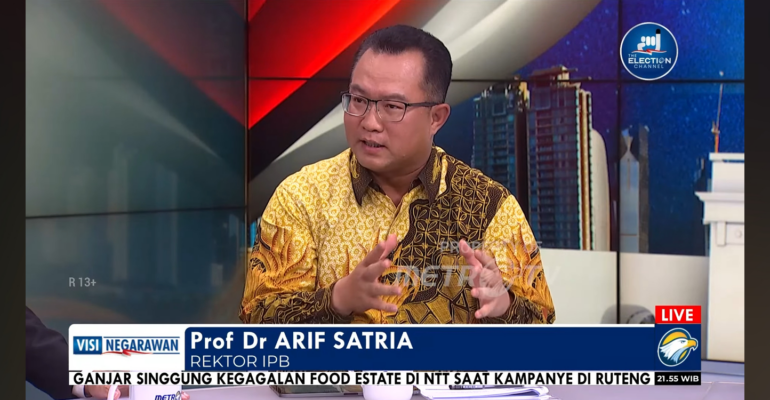Rector of IPB University: Campus Must Colour Political Education and Produce Ideal Leaders

The majority of Indonesia’s workforce are elementary school graduates, while higher education graduates are experiencing a downward trend. The low quality of human resources will affect the quality of development of political ideology, socio-culture, and state security. This can affect the ability to think critically, namely making judgements rationally and systematically, especially in choosing and observing the right leader candidates for Indonesia.
Prof Arif Satria, Rector of IPB University said, intelligence and educating the nation is a multidimensional issue. This issue concerns the quality of education and the innovation index. “Campus as a higher education system must be able to oversee and colour political education and human character in Indonesia so that the democratic process is more qualified,” he said.
He conveyed this in the Statesman’s Vision event themed ‘Smart Nation Thinking Bernas’ on Metro TV, on Friday, 26/1. He continued, universities must be realistic in seeing market needs. But at the same time, graduates need to be equipped with qualified life skills.
“We should start to realise that from the primary and secondary levels, character education must begin to be built such as ways of thinking, maturity and so on, so that the higher education system is focused on increasing adaptability in responding to change. The mentality of creating future learners should be the focus of education reform in Indonesia,” he continued.
“Academic freedom and voice based on conscience and data must continue to be voiced because it is very important to implement a democratic process based on checks and balances. This culture of critical thinking has also been built by IPB University by inviting students regarding campus policies and debating based on factual data,” explained Prof Arif.
According to him, role models and justice are very important in the education process. Campus as a forum for civil society to democratise must be able to oversee a more mature and quality democratic process. “The maturity of democracy is important so that the campus can colour political education so that the quality of democracy will be guaranteed,” he concluded.
Prof Arif said it would take seven elections or 10 more years for Indonesia to reach democratic maturity. The projection results of political experts are increasingly relevant to the current facts. “Guarding good criticism will give birth to leaders who are not just legitimacy but substance for the future progress of the nation,” he said.
On the other hand, he continued, the government must be able to boost the global innovation index that reflects the economic level and quality of industry and human resources in Indonesia. This index requires leverage factors in the form of human resources and downstream innovation.
“There is a correlation between the global innovation index and the distribution of the proportion of the research budget by industry, so inevitably innovation must be boosted because the results of the correlation test show that this index is positively correlated with the amount of Gross Domestic Product (GDP) per year,” he said. (MW/Lp) (IAAS/RSL)


